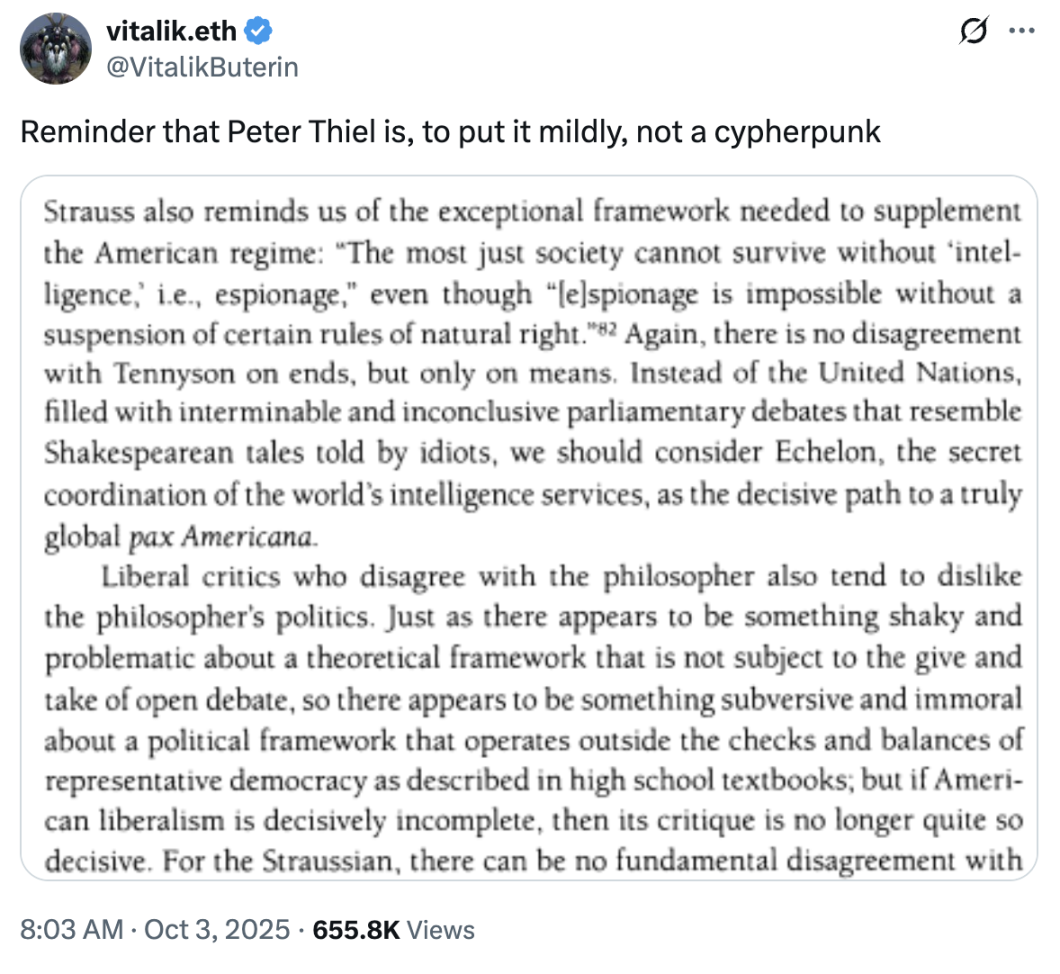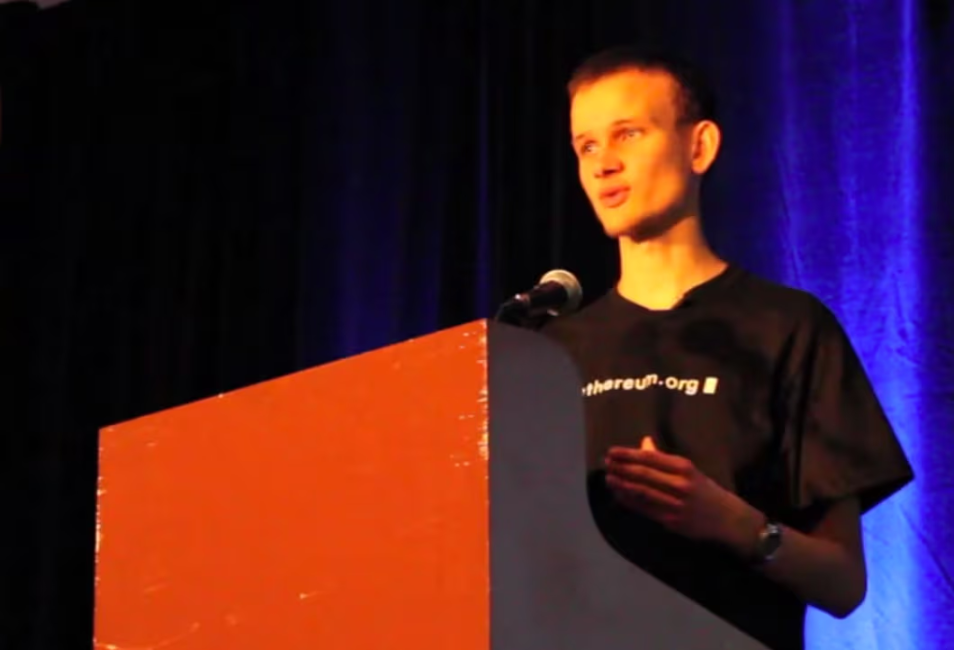Author: Eric, Foresight News
Yesterday morning Beijing time, Ethereum co-founder Vitalik Buterin posted a screenshot on X of an article written by Peter Thiel in 2009, captioning it: "Reminder that Peter Thiel is, to put it mildly, not a cypherpunk."

If two months ago Vitalik's concerns about Ethereum DAT leading to excessive leverage risks were merely a "good-natured reminder," then this time targeting Peter Thiel, a supporter of the two major Ethereum DAT listed companies BitMine and ETHZilla, can be seen as a "positive challenge." However, this challenge does not seem to be entirely directed at DAT companies. Vitalik's real concern may relate to Peter Thiel's extremely radical political views, which stand in stark opposition to the cypherpunks who uphold decentralization as a principle.
Peter Thiel: No Longer Believing That Freedom and Democracy Are Compatible
In October last year, Polymarket refuted The New York Times' politically biased reporting, stating that while Peter Thiel is the founder of Founders Fund, an investor in Polymarket, his political leanings would not affect the platform's operations.
Peter Thiel's extreme political leanings are no longer news, but it seems to be the first time they have been widely discussed in the Web3 world.
The screenshot posted by Vitalik comes from Peter Thiel's 2009 article "The Education of a Libertarian," in which Thiel expressed extreme disappointment with politics, arguing that libertarians at the time should find a way to escape various forms of politics. He stated, "Since there is no longer a truly free place in our world, I suspect that the way to escape must involve some entirely new method that has never been tried before, leading us to some unknown territory; for this reason, I am committed to researching new technologies that may create new spaces for freedom."
The new technologies mentioned by Peter Thiel include three possible domains: cyberspace, space, and the ocean.
The publication date of this article coincided with the early days of Bitcoin, against the backdrop of a global financial crisis triggered by greed on Wall Street. Peter Thiel advocates using technology to bypass politics and create an absolutely libertarian utopia, but he does not subscribe to the "technological utopianism" that believes technology has its own momentum and will. Instead, he believes technology should confront politics to create a new world not controlled by politics.
In this description, it seems that Peter Thiel's views are similar to those of the early cypherpunks, who believed that technology could create a better world and that technological development would one day break the constraints of politics, giving birth to a truly free nation.
Founders Fund, where Peter Thiel serves as managing partner, has invested in many types of Web3 projects, including Polymarket, Avail, the parent company of Pudgy Penguins, and the Rollup-as-a-Service platform Caldera in recent years. In terms of the belief that "technology changes the world," Peter Thiel aligns with crypto fundamentalists, but he has taken a different extreme in the means of achieving it.
In "The Education of a Libertarian," Peter Thiel's expressed disappointment with democracy is actually a disappointment with "egalitarianism." Since the expansion of universal suffrage in the 20th century in the U.S. (especially women's suffrage) and the expansion of the welfare state, "capitalist democracy" has become a self-contradictory fantasy. In his view, the average voter tends toward egalitarianism, which would hinder a truly free market; therefore, libertarians should "escape politics" rather than try to persuade the majority of voters.
Peter Thiel and his followers, who have a superior understanding of technology and future development directions, trust that society should be governed by "the best people," namely the technological and capital elite, rather than relying on one-person-one-vote democratic processes. The companies he invests in, such as Palantir and Anduril, undertake numerous government surveillance and border enforcement projects, criticized for "replacing democratic decision-making with algorithms and big data," essentially outsourcing public power to opaque high-tech private enterprises.
Born in Frankfurt, Peter Thiel's reading list includes works by Nazi legal scholar Carl Schmitt, civilization decline theorist Oswald Spengler, and "Sovereign Individual." The commonality among these ideas is a disdain for universal suffrage, a reverence for strong authority, and a belief in historical cycles and "states of exception." Peter Thiel combines Carl Schmitt's "friend-enemy" political view and Oswald Spengler's "good times - bad times" dictatorial fatalism with Silicon Valley's "technological acceleration" discourse, forming a hybrid ideology of "hyper-neoliberalism + anti-democracy," which scholars have described as carrying the risk of a fascist variant.
In a passage from the new book "Owned: How Tech Billionaires on the Right Bought the Loudest Voice on the Left," published in February this year by renowned American journalist and historian Eoin Higgins, it describes how after Trump's victory in 2016, tech leaders flocked to curry favor. On December 14, 2016, Thiel attended a Trump campaign meeting. This billionaire investor also brought along allies Elon Musk and Alex Karp, even though the companies they led at the time, Tesla and Palantir, were not on the same level as Google, Microsoft, and Apple.
During Trump's second term, Vice President Vance and David Sacks, the White House cryptocurrency and AI director known as the "crypto czar," both had Peter Thiel's influence behind them, while Musk, who was brought into the White House during the first term, became another representative of Silicon Valley elitism. The world's richest man, who studies whether rocket launches affect seal emotions, has developed an almost insane hatred for the government, or more precisely, the bureaucracy, and this hatred has transformed into a frenzied liquidation of certain government departments by DOGE. Clearly, this extreme ideological opposition has made Vitalik feel a sense of unease.
Whose Freedom Is True Freedom?
While both advocate for changing the world with technology, Peter Thiel chooses to let elites control technology to dominate "the masses," while Satoshi Nakamoto and Vitalik believe more in technological egalitarianism, forming an absolute ideological opposition. What Vitalik truly worries about is a group of tech elites holding vast capital using their capital and discourse power to turn Ethereum into a formally decentralized network controlled by extreme authoritarian figures. At that point, Ethereum may still be the world computer, still hosting the majority of transactions for stablecoins and tokenized RWAs, but it would no longer resemble what cypherpunks envision Ethereum should be.
Vitalik's direct motivation for developing Ethereum stemmed from Blizzard weakening his favorite character in "World of Warcraft," but he does not oppose weakening; he simply believes that such decisions should be made in a more democratic manner, and even if the final voting decision is still to weaken, it can be accepted. Conversely, if the same situation occurred with Peter Thiel, he would unilaterally choose not to weaken. This may be the biggest difference between the two.
In the comments section of that tweet, Vitalik agreed with the view that "Ethereum ultimately needs to stop development at some point like Bitcoin, or minimize maintenance," supporting gradual rigidity and adopting a more cautious attitude toward significant changes to the protocol after short-term scaling, streamlining Ethereum, and clearing technical debt.
This view actually corresponds to the "technological utopianism" mentioned by Peter Thiel, but for Thiel, who embodies a denial of democracy, technological authoritarianism, and capital usurpation, exceeding the boundaries of conventional conservatism or libertarianism, the freedom he envisions seems to limit the freedom of the majority for the absolute freedom of a minority. This assertion, imbued with absolute "right" and "wrong," appears to lead "absolute political domination" to another extreme of "absolute technological elite domination."

Interestingly, Vitalik received a $100,000 grant from Peter Thiel in 2014 to develop Ethereum. Eleven years later, the once naive youth is no longer overly insistent on crypto fundamentalism but has become one of the spiritual leaders of the decentralized world, while Peter Thiel still clings to an extreme ideology that the author cannot find suitable adjectives to describe.
In the next decade, will Ethereum become a weapon of absolute freedom for a select few, or a tool of relative freedom for the majority?
免责声明:本文章仅代表作者个人观点,不代表本平台的立场和观点。本文章仅供信息分享,不构成对任何人的任何投资建议。用户与作者之间的任何争议,与本平台无关。如网页中刊载的文章或图片涉及侵权,请提供相关的权利证明和身份证明发送邮件到support@aicoin.com,本平台相关工作人员将会进行核查。




